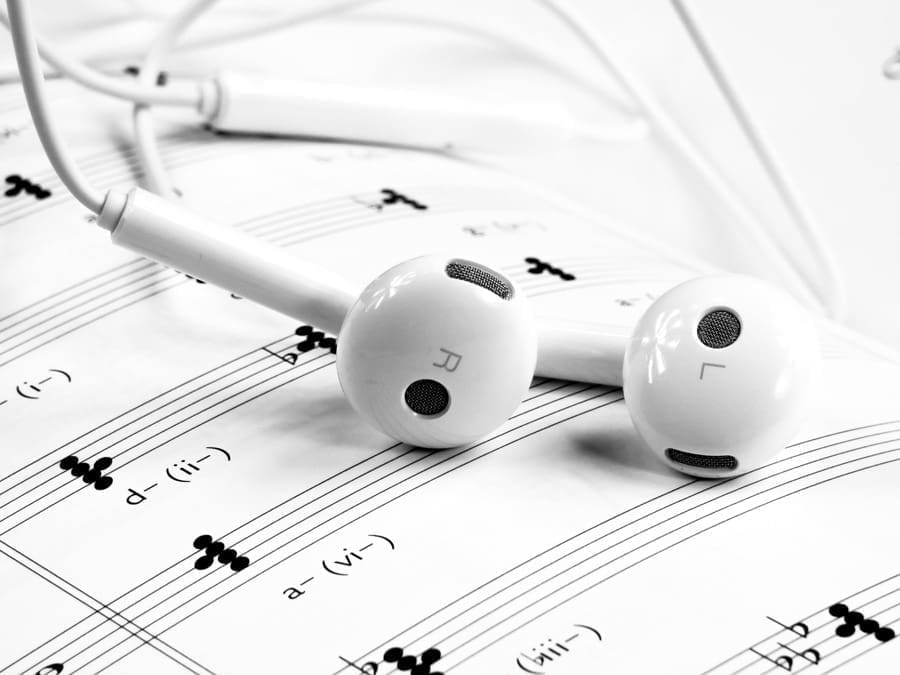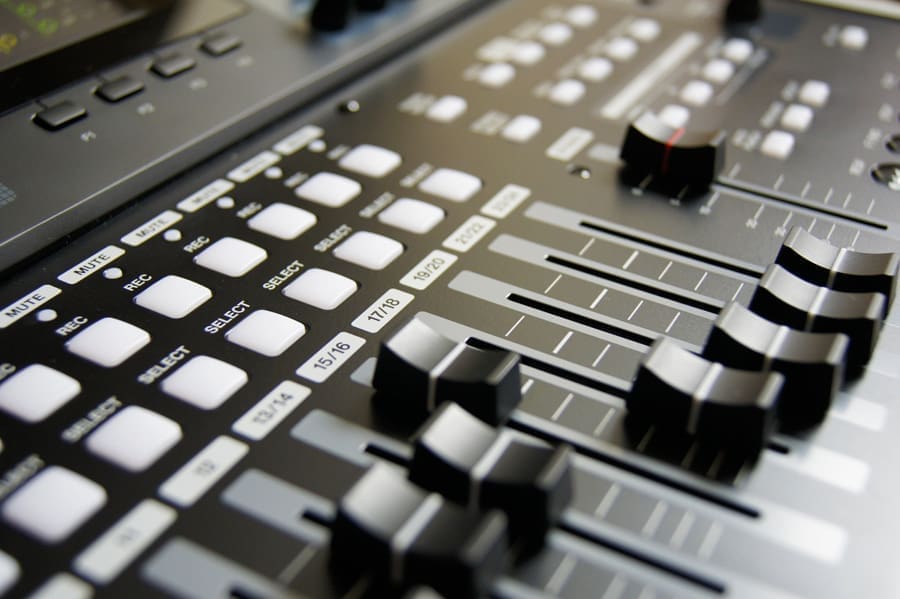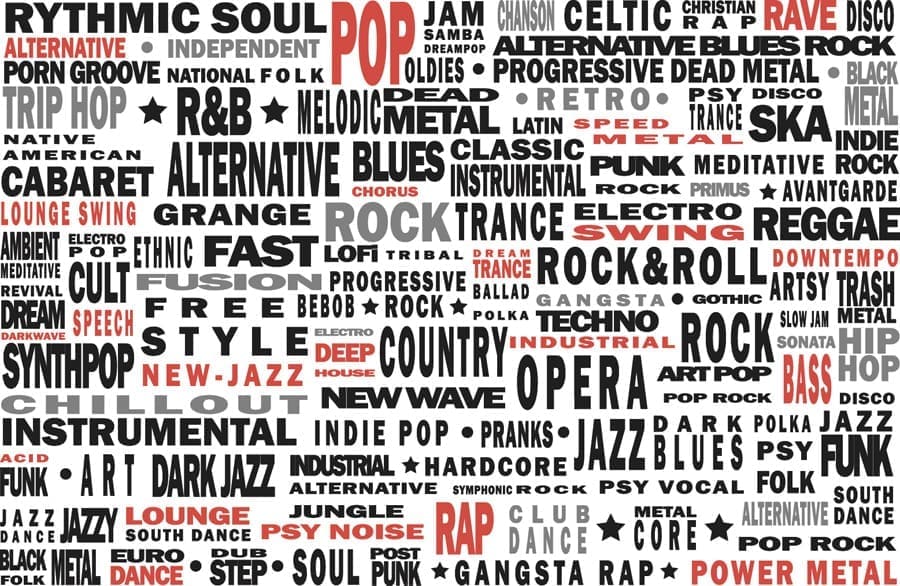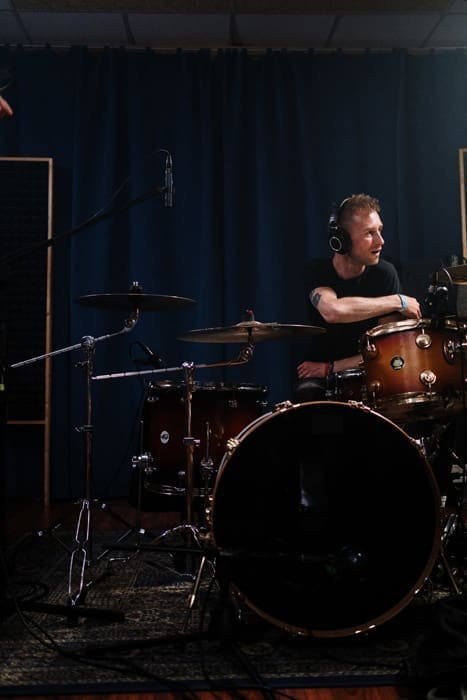Are you looking to sharpen your musician skills for a competitive edge in today’s music industry? From mastering your instruments and vocal techniques to leveraging technology and expanding your professional network, this article unpacks the top 10 essential skills that every musician must cultivate to thrive. Dive in to transform your musical passion into a flourishing career.
Key Takeaways
- Musicians must excel in their craft through consistent practice, embrace diverse genres, and understand music theory to navigate the competitive music industry successfully.
- Adapting to digital platforms and technology is crucial for musicians, including mastering music production, maintaining a robust social media presence, and leveraging music videos to enhance visibility and connect with audiences.
- Networking and collaboration with industry professionals and other musicians are vital for career growth, as are live performances for skill honing and audience engagement.
Mastering Your Craft

Crafting the inaugural note of a symphony requires expert skill. It goes beyond simply hitting the correct chords or refining your vocals. The key elements are constantly striving for perfection, staying committed to practicing, and infusing each note with passion.
The music industry is highly competitive, but successful musicians will attest that having strong enthusiasm for their genre combined with unyielding determination can help them reach great heights in their career. In this realm of music where competition is fierce, it takes true dedication and perseverance to excel as a musician.
Musical Instruments
For musicians, their instruments are more than just mere tools, they serve as an extension of their soul. Mastering these instruments requires consistent and daily practice rather than sporadic long sessions.
Whether you perform solo or as part of a larger ensemble, it is essential to understand the intricacies of your instrument and the music it produces. Each instrument has its own unique language, from guitar strings to piano keys. By regularly practicing, one can grasp this language and effectively showcase their musical talent.
Vocal Techniques

Vocal music is the soul of any musical piece, while instruments make up its body. Singers bring life and emotion to a melody, turning it into an expressive journey. For vocalists, mastering different techniques is like having a toolbox filled with various emotions to use in their performances, making vocal music crucial in this process.
From perfecting posture and warming up properly to utilizing vibrato and conquering different registers, each technique serves as a key that can unlock unique feelings during singing. This helps singers connect with their audience on a more profound level through their performance.
Music Theory

Music theory serves as the language through which music is communicated. It functions like a grammar, assigning meaning to melodies and providing structure to symphonies. Understanding this crucial aspect of music is akin to having a map that guides musicians in navigating the dynamic landscape of musical expression. By delving into its intricacies, performers gain the ability to handle complex rhythms, improvise over chord progressions, and create pieces that deeply resonate with their audience.
For classical musicians specifically, knowledge of music theory can greatly enhance their interpretation skills when performing compositions by other artists. This understanding also allows them greater precision in execution during live performances or recording sessions. Beyond these benefits for existing works of art by others though, is ultimately it elevates own personal creative abilities as well. The application was successful.
Acquisition of theoretical knowledge truly empowers those skilled at creating new masterpieces intended from inception on capturing public attention.
Embracing Technology
In the contemporary digital era, the rhythm of music harmonizes with the rhythm of technology. The advent of digital platforms, social media, and advanced production tools has revolutionized the music industry, making it crucial for musicians to tune their skills to the digital beat.
Here are some ways modern musicians can embrace technology.
- Creating high-quality recordings
- Building a robust social media presence
- Leveraging technology to connect with fans
- Using technology for creating visually appealing music videos
Embracing technology is no longer an option, but a necessity for modern musicians.
Music Production

Technology plays a crucial role in the world of music production, providing musicians with powerful tools to transform their raw melodies into captivating symphonies. These modern technology advancements allow for experimentation with various sounds, effects, and textures that enhance musical expression. To create professional-quality recordings, there are several essential tools at the disposal of a music producer such as Digital Audio Workstations (DAWs), MIDI controllers, studio headphones and audio interfaces.
With access to these technological innovations, from arranging to mixing and mastering tracks becomes easier than ever before for music producers. They now have complete control over every aspect of the production process, allowing them to bring their musical vision to life seamlessly.
Social Media Presence
In today’s interconnected society, social media has become a crucial platform for musicians to showcase their talent. While live performances remain an important aspect of their career, having a strong presence on digital platforms is equally vital. Through various social media channels, artists can connect with fans worldwide and promote their work effectively. This helps them in building a dedicated fan base and teasing upcoming songs by sharing snippets.
Interactions on these platforms hold immense potential as they provide opportunities for musicians to leave a lasting impact on the audience. It is not enough just to be present. Being active, genuine and interactive are essential aspects that make an artist stand out among others.
Having said that keeping up with one’s presence across multiple social media handles requires consistent efforts from musicians, showcasing authenticity while actively engaging with followers through comments or other forms becomes necessary when trying to build connections within the audience.
Music Videos
Music videos are the visual representation of music, enhancing the auditory experience. They provide artists with a platform to showcase their artistic vision and convey their message while also establishing an aesthetic for their music. Whether produced on a large budget or through self-made efforts, well-crafted music videos have proven to be effective in increasing exposure and attracting new fans for musicians.
With advancements in technology, it has become more feasible than ever for musicians to create compelling visuals that complement their musical journey. This allows them to add another layer of storytelling and creativity to accompany their songs visually.
Networking and Collaboration
In essence, music is an art form that thrives on cooperation. It involves combining various notes, rhythms and melodies to produce a symphony. Similarly, building a successful career in the music industry often relies on networking and collaborating harmoniously with others. From connecting with professionals within the field to working alongside fellow musicians, every interaction presents an opportunity for growth and innovation.
Engaging in live performances and jam sessions not only allows musicians to refine their skills, but also expands their network within the music industry.
Connecting with Industry Professionals
In the world of music, who you know is often just as crucial as what you know. Making connections with industry experts can open doors to new opportunities, collaborations and educational experiences. Whether it entails attending professional events or contacting professionals through social media platforms, each interaction provides a chance to expand your network and gain knowledge from the best in the field.
It’s important to keep in mind that networking should not be approached like selling. Instead focus on building genuine relationships that are mutually beneficial for both parties involved.
Collaborating with Other Musicians
The partnership between musicians is what drives progress and originality in music. By working together, artists can explore fresh musical concepts, enhance their abilities, and produce groundbreaking pieces that transcend boundaries of genres.
Collaboration provides a valuable platform for musicians to improve by learning from each other’s strengths through live performances or recording sessions. To this growth process within the art itself, teamwork also helps expand one’s network in the music industry. It exposes their work to new audiences and creates opportunities for recognition among peers.
Live Performances and Jam Sessions

The stage is the place where music truly comes to life. From concerts and jam sessions, live performances do more than just entertain their audience. They also serve as a platform for showcasing musical abilities, connecting with listeners, and making a lasting impact. Performing in front of an audience offers valuable feedback that musicians can use to refine their talents and enhance future shows.
No matter if it’s playing at a small local venue or headlining at a major music festival, each live performance provides opportunities for artists to develop personally and professionally while basking in the spotlight.
Business Acumen
In the world of music, achieving success often requires a harmonious blend of business know-how. Whether it involves negotiating contracts, promoting oneself or managing finances, having a grasp on the business side of things is essential for musicians. Not only does this safeguard their rights and interests, but also provides them with the necessary tools to navigate through an increasingly competitive industry.
It’s important to recognize that attaining a thriving music career goes beyond creating exceptional art. Effectively handling all aspects of the music business plays an equally vital role.
Contract Negotiation
Comprehending the legal aspects of the music business can be as complex as creating a musical composition. Possessing knowledge about contracts and being able to negotiate them effectively is crucial for protecting musicians’ interests and ensuring just compensation. Whether it involves clarifying terms of collaborations or outlining distribution methods for royalties, skillful contract negotiations are key in transforming a fleeting success into a sustainable career in music.
It is vital that musicians devote time to familiarize themselves with contractual agreements and seek professional assistance when necessary.
Marketing and Promotion
In the orchestra of the music industry, marketing and promotion are the conductors that guide the melody to its audience. From branding and social media marketing to networking and performing live, effective marketing strategies can help musicians reach a wider audience and generate income.
But remember, effective marketing is not just about selling music; it’s about telling a story, connecting with the audience, and creating an experience that resonates with them.
Financial Management
Just as maintaining a steady beat is essential for an engaging performance, keeping financial stability is vital for the longevity of one’s music career. From budgeting and monitoring expenses to negotiating agreements and diversifying sources of income, effective money management can assist musicians in navigating the ups and downs that come with pursuing a career in music.
A thriving music career involves more than just making money. It also requires skillful handling of finances to sustain one’s love for creating music.
Versatility and Adaptability
Versatility and adaptability are crucial for navigating the ever-changing landscape of the music industry. Musicians can demonstrate these traits by exploring various genres, learning multiple instruments, collaborating with diverse artists, adapting to technology and trends, and experimenting with different sounds.
Diversifying one’s musical repertoire through exploration of new genres or acquisition of new instrument skills is essential in expanding creativity as well as reaching a broader audience. The willingness to step out of comfort zones ultimately leads to becoming more versatile and adaptable musicians.
The ability to embrace versatility enables musicians to keep up with changes in technology within the constantly evolving music industry while also broadening their fan base by appealing across different types/styles/genres/sounds.
Exploring Different Genres

Music, a universal language, is expressed in different genres that serve as its distinct dialects. Each genre possesses its own characteristic rhythms and melodies, from the energetic beats of Hip Hop to the complex arrangements of Classical Music. Exploring various genres allows musicians to expand their musical vocabulary, foster creativity and connect with new listeners.
Incorporating elements from diverse genres enables artists to craft a distinctive sound that resonates with a broader audience base. This integration not only helps in reaching out to new audiences, but also serves as an avenue for self-expression through music’s boundless possibilities across multiple styles.
Learning New Instruments

Similar to how an artist uses various tools to create a masterpiece, a musician relies on different instruments to compose their symphony. Each instrument, whether it be the drums’ rhythmic beats or the violin’s soothing melody, adds its own distinct element to the music. Not only does learning new instruments increase a musician’s versatility, but it also expands their understanding of music.
Moreover, the process of acquiring knowledge in a new instrument can serve as inspiration and lead them towards creating unique melodies and rhythms that are not confined by traditional musical boundaries.
Adapting to Industry Changes
The music industry is always in motion, just like the rhythms that define it. With advancements in digital platforms and blending of various genres, this sector continues to transform. In order to maintain their relevance and success, musicians must be able to adapt effectively.
From embracing innovative technology to experimenting with unfamiliar genres, adapting accordingly allows musicians to keep up with changing trends and connect with their audience. By staying attuned to the evolution within different genres of music, artists can continue resonating successfully with their listeners.
Soft Skills Development
The key to a successful music career extends beyond just playing notes and rhythms. It also involves mastering soft skills. Communication, time management, emotional intelligence, these are all crucial abilities for musicians to develop. Not only do they help with effective collaboration and professional responsibilities, but they also equip artists with the necessary tools to navigate the complexities of their careers.
Soft skills play an essential role in various aspects of a musician’s journey. They allow them not only to handle different musical styles and genres, but also establish deep connections with audiences through performances. Having strong soft skills can help musicians cope with criticism and rejection gracefully while fostering positive relationships within bandmates and other industry professionals.
Ultimately, creating beautiful melodies is not enough in the world of music. Understanding emotions plays an integral part as well as managing one’s time effectively. By honing their soft skills alongside their technical proficiency, students enhance both success levels and personal satisfaction in their chosen field.
Communication Skills
Effective communication is the key to success in a music career, acting as the symphony that brings all aspects together. Whether working with fellow musicians or networking with industry professionals, effective communication plays a crucial role at every stage of one’s journey in the world of music. It involves both understanding and being understood, listening actively and making oneself heard.
Musicians who work on honing their communication skills can collaborate seamlessly, establish strong connections within their networks and forge deeper relationships with their audience through heartfelt engagement.
Time Management
In the realm of a music profession, proper time management serves as the foundation that keeps everything in perfect harmony. Whether it involves balancing artistic and occupational duties or setting aside sufficient rehearsal and performance hours, effective time management plays a crucial role for musicians. It is all about maximizing every moment by finding balance between work demands and personal needs.
By honing their skills in managing time effectively, artists can enhance their productivity levels while also reducing stress factors. This results not only in creating exceptional quality music, but also leads to an overall fulfilling musical journey.
Emotional Intelligence
Emotional intelligence is the key to understanding music, which serves as a language for emotions. This skill allows musicians not only to manage their own feelings, but also understand and connect with the emotional experience of their audience. It plays an essential role in navigating the ups and downs of a career in music.
Nurturing one’s emotional intelligence enables musicians to form stronger bonds with their listeners, effectively collaborate with other artists, and create melodies that deeply resonate with people’s emotions. In essence, it is about tapping into this aspect of themselves while performing or composing so they can elicit emotion from others through their musical expressions.
Music Education and Professional Development

The journey towards a flourishing music profession typically begins with acquiring knowledge in music and continues with constant improvement. Whether through formal education or one-on-one instruction, each learning opportunity contributes to becoming an accomplished musician. It involves grasping the language of music, enhancing abilities, and perfecting artistic skills.
By pursuing both structured training and ongoing professional development, a trained musician can establish a solid groundwork for their career while keeping up-to-date on emerging trends and methods within the ever-evolving realm of the music industry.
Formal Music Education
Formal music education can be likened to a roadmap for a successful music career. It offers an organized and structured approach to learning, encompassing various aspects such as understanding of:
- fundamental principles in music
- technical abilities
- historical context
- live performances
Whether one pursues a bachelor’s degree program in the field or receives training from a conservatory, formal musical education provides individuals with thorough knowledge about all aspects related to their chosen path in the world of art. This equips them with essential skills and sets strong foundations for their future endeavors.
Private Lessons
Individual sessions, known as private lessons, serve as crucial practice opportunities for refining one’s musical journey. They offer personalized support to musicians in honing their abilities and addressing any weaknesses they may have. From mastering a new instrument to enhancing vocal techniques, private lessons grant the tailored attention necessary for quick progress.
To this, private lessons provide a secure environment where musicians can experiment freely without fear of making errors. This allows them to learn at their own pace while receiving valuable guidance from an experienced instructor.
Workshops and Seminars
The music industry is full of opportunities for musicians to enhance their skills and stay current with the latest trends. Workshops and seminars act as jam sessions, encouraging new ideas in a musician’s career symphony.
These events provide an ideal platform for musicians to learn from experts, exchange thoughts with peers, and explore advancements in techniques within the songwriting or music production fields. Whether attending workshops focused on writing lyrics or participating in seminars highlighting cutting-edge equipment usage during productions, every event offers valuable knowledge essential for furthering one’s music career.
Diversifying Income Streams
In the world of music, having a variety of ways to earn income is key in creating financial stability. Musicians can achieve this by diversifying their sources of revenue through various means.
- Working as session musicians for different projects.
- Providing teaching or mentorship services to others who are looking to learn from their expertise.
- Taking on performances at events like weddings and parties.
Selling merchandise such as t-shirts and CDs, along with licensing music for use in commercials, TV shows and movies.
Diversification allows musicians to pursue what they love without being weighed down by monetary worries. It also creates an avenue where steady earnings can be made.
It’s important to remember that making money isn’t everything when it comes to pursuing a career in music – ultimately achieving success lies more than just one’s finances.
Session Musicians

For numerous musicians, their stage presence goes beyond just being in the spotlight during a solo performance. They also play a supportive role as session musicians, lending their musical talents to enhance and elevate the music of other recording artists while earning a steady income.
Regardless of whether they are strumming on the guitar for a catchy pop tune or keeping time on the drums for an energetic rock band, every session presents valuable opportunities for learning and growth while still bringing in financial stability through playing music.
Teaching and Mentoring
Sharing knowledge and skills through teaching and mentoring can add depth to a musician’s music career. Not only does it provide a steady income, but also allows them to contribute towards the growth of the music community. Whether imparting musical education to children or guiding young musicians, every lesson is an opportunity for inspiration, making a positive impact while earning from their passion, music.
Summary
The symphony of a successful music career is composed of diverse skills, each echoing the rhythm of mastery, adaptability, collaboration, business acumen, education, and more. It’s not just about hitting the high notes or striking the right chords; it’s about harmonizing the melody with the rhythms of business, technology, networking, and personal growth. From mastering your craft to diversifying income streams, each skill is a distinct note that harmonizes to compose the symphony of a successful music career. So tune your skills, practice your melody, and let the world dance to your symphony!
Frequently Asked Questions
What are some skills musicians need?
Proficiency in ear training, music theory and notation, instrumental technique and ensemble work are essential skills for musicians. Along with the ability to produce a high-quality sound, effective communication on stage and connection with the audience are also key elements. Consistent dedication to daily practice is crucial as well.
To natural talent, aspiring musicians must possess motivation, determination, and resilience when facing challenges. Confidence in performing before an audience is vital while teamwork abilities, collaborative mindset, discipline, and savvy promotional skills play significant roles in finding employment opportunities within this industry.
What are the 5 music skills?
There are five core abilities that make up the foundation of music: proficiency in playing an instrument or singing, knowledge and comprehension of music theory and notation, a keen ear for pitch and rhythm, and the aptitude to interpret and deliver musical performances with emotional expression. These essential skills are crucial for musicians looking to excel in their field.
Mastering these fundamental elements is necessary for any musician seeking success. Such expertise encompasses not only technical prowess on an instrument or vocal ability, but also understanding the complexities behind how music works through theoretical concepts. Additionally, additional information is provided below.
How can embracing technology benefit musicians?
Incorporating technology into their craft can greatly benefit musicians in various ways. Firstly, it allows for enhanced music production by providing tools and software that aid in creating high-quality sound recordings. With the rise of social media platforms, technology has become a powerful tool for promoting music to a wider audience effectively.
Technology offers an avenue for musicians to explore their creativity when it comes to creating visually appealing content such as music videos. This is not only the case.
How crucial is networking for a musician’s career?
For musicians, networking is an essential component of their career as it allows for the formation of partnerships, facilitates the creation of new connections and relationships, contributes to professional growth and advancement opportunities, and grants access to valuable skills, knowledge, and tools. As a result, it holds significant importance in achieving success.
Why is formal music education important for a musician’s career?
Receiving a formal music education is crucial for the success of any musician as it lays down a solid groundwork, enriches knowledge on music theory, enhances technical abilities and exposes individuals to diverse musical genres and techniques. This form of education plays an integral role in professional advancement within the thriving industry of music.
Subscribe today not to miss a thing.
My blog posts of the week emailed to you in a nice little (email) package.


